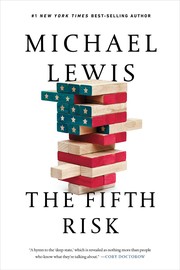Check nearby libraries
Buy this book

Michael Lewis's brilliant narrative takes us into the engine rooms of a government under attack by its own leaders. In Agriculture the funding of vital programs like food stamps and school lunches is being slashed. The Commerce Department may not have enough staff to conduct the 2020 Census properly. Over at Energy, where international nuclear risk is managed, it's not clear there will be enough inspectors to track and locate black market uranium before terrorists do.
Willful ignorance plays a role in these looming disasters. If your ambition is to maximize short-term gain without regard to the long-term cost, you are better off not knowing the cost. If you want to preserve your personal immunity to the hard problems, it's better never to understand those problems. There is an upside to ignorance, and a downside to knowledge. Knowledge makes life messier. It makes it a bit more difficult for a person who wishes to shrink the world to a worldview.
If there are dangerous fools in this book, there are also heroes—unsung, of course. They are the linchpins of the system: those public servants whose knowledge, dedication, and proactivity keep the machinery running. Michael Lewis finds them, and he asks them what keeps them up at night.
Check nearby libraries
Buy this book

Subjects
Politics and government, Civil service, Management, Administrative agencies, Public administration, Government executives, United states, politics and government, 2017-, Civil service, united states, nyt:combined-print-and-e-book-nonfiction=2018-10-21, New York Times bestseller, New York Times reviewed, BUSINESS & ECONOMICS / Commercial Policy, POLITICAL SCIENCE / American Government / National, POLITICAL SCIENCE / Public Policy / Agriculture & Food Policy, POLITICAL SCIENCE / Public Policy / Energy PolicyPlaces
United StatesTimes
2017-| Edition | Availability |
|---|---|
|
1
The Fifth Risk
2018, W. W. Norton & Company, W.W. Norton & Company, Lewis, Michael
Hardcover
in English
- First edition.
1324002646 9781324002642
|
aaaa
|
Book Details
Table of Contents
Edition Notes
Classifications
The Physical Object
Edition Identifiers
Work Identifiers
Source records
marc_openlibraries_sanfranciscopubliclibrary MARC recordBetter World Books record
amazon.com record
marc_columbia MARC record
marc_nuls MARC record
Promise Item
Excerpts
The book is named for five risks to the U.S. government as posed by John MacWilliams. MacWilliams suggests 'fifth risk' is long-term project management.
This paragraph builds on the quote summarizing the book (inside the dust jacket). It goes on to describe a Department of Energy program ARPA-E that funded the creation of GPS and the internet by making small grants to researchers; Trump's first budget eliminated ARPA-E.
This excerpt comes from a discussion with Ali Zaidi at the Department of Agriculture, describing the two broad functions that the DOA performs.
Links outside Open Library
Community Reviews (0)
| December 17, 2022 | Edited by MARC Bot | import existing book |
| October 17, 2021 | Edited by David Scotson | Edited without comment. |
| August 7, 2021 | Edited by New York Times Bestsellers Bot | Add NYT review links |
| August 6, 2021 | Edited by New York Times Bestsellers Bot | Add NYT bestseller tag |
| May 24, 2019 | Created by MARC Bot | import new book |









